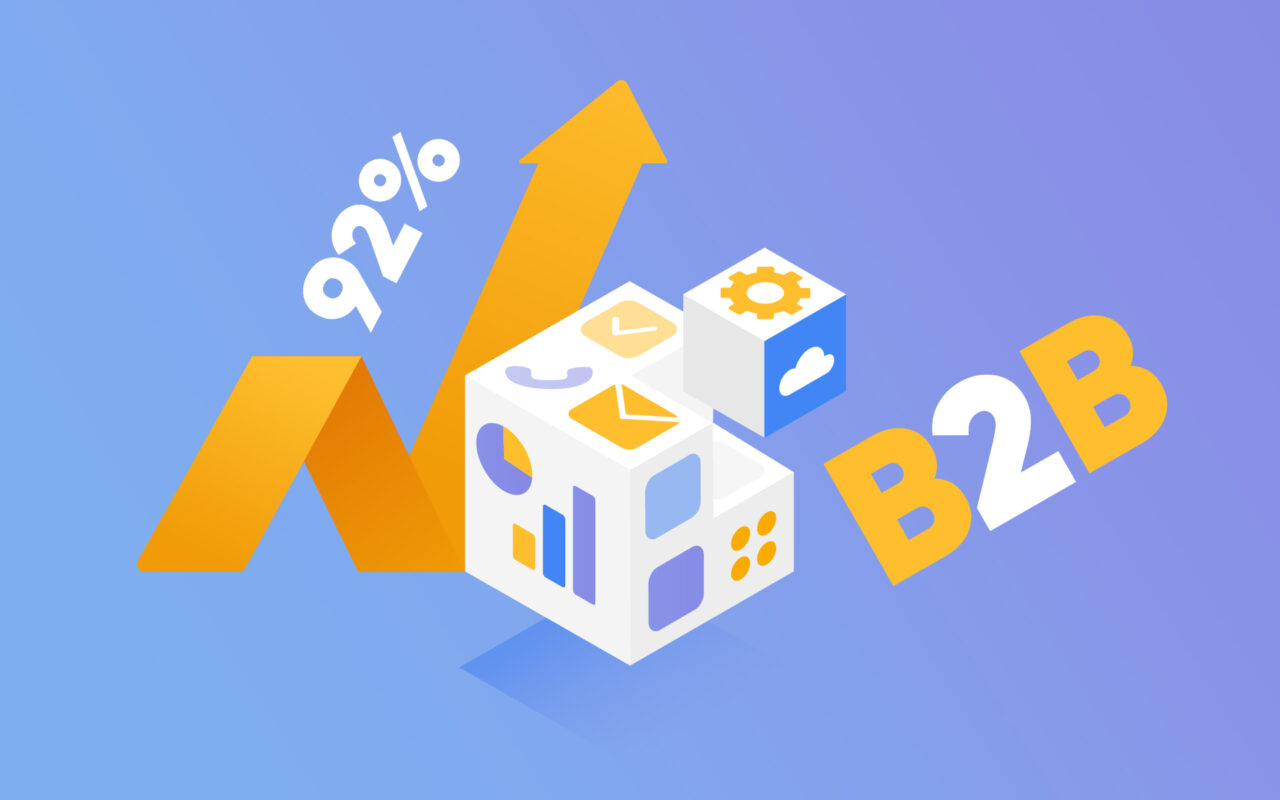Every B2B team navigates a maze of relationships, deals, and data. But are they leveraging the full potential of these connections? In an era where precision and agility dictate success, is your team equipped with the right tools to excel? The pivotal role of CRM software in B2B can't be understated.

With an array of choices flooding the market, which one truly stands out as the best B2B CRM software? How does one distinguish between the 'good' and the 'exceptional'? And more importantly, is your team harnessing the exceptional to stay ahead?
These aren't just questions; they're challenges that define the trajectory of modern B2B ventures.
The answer predominantly lies in that which makes a CRM solution indispensable for B2B teams. In fact, 92% of businesses rely on CRMs to help them achieve sales goals.
Furthermore, we have CRMs, like eWay-CRM, that integrate with a world-renowned B2B email tool – Microsoft Outlook.
Understanding the Core Needs of B2B Teams

B2B teams operate differently from their B2C counterparts. The intricacies lie not just in the products or services they offer, but also in the relationships they build and nurture over time. Identifying and understanding these core needs is crucial to choosing the right CRM.
- Complex Sales Cycles: B2B sales cycles often run long, featuring multiple touchpoints and interactions. Throughout this journey, ensuring consistent customer satisfaction can be the difference between closing a deal and losing one. An effective CRM not only manages these complexities but also offers insights to enhance customer engagement at every step.
- Relationship Depth: Unlike fleeting B2C interactions, B2B relationships often span months or even years. This extended interaction demands a deep understanding of each client's preferences, needs, and history. The right CRM captures this depth, paving the way for more tailored and satisfying customer interactions.
- High-Value Transactions: Given the magnitude of B2B transactions, the stakes for customer satisfaction are high. A single oversight can be costly. Here, a robust CRM system shines, ensuring meticulous tracking, alerting teams of potential issues, and maintaining the quality of engagement.
- Customization: B2B operations vary vastly. What satisfies one client might not resonate with another. Hence, a CRM that allows for customization ensures that interactions, communications, and solutions are always aligned with individual client expectations.
- Integration Capability: Seamless integration with other business tools isn't just about operational efficiency. It's about ensuring that every piece of data, every interaction, and every decision augments customer satisfaction. When a CRM integrates effortlessly with other tools, it ensures that teams have all the information they need, when they need it.
- The Indispensable Need for Analytics and Forecasting: B2B businesses can't operate on gut feelings alone. Decisions must be data-driven. A specialized CRM system not only provides businesses with past data but, more crucially, offers actionable insights and forecasts, helping companies strategize their future moves with confidence.
Top Features to Look for in the Best B2B CRM Software
Navigating the options of CRM software can often feel like traversing a maze. However, for B2B businesses to harness the real power of a CRM system, it's vital to look beyond the shiny bells and whistles. Instead, they should focus on key features that directly align with their operational needs:
- Contact Management: At its core, any CRM’s primary function is to manage contacts. But for B2B entities, it's about the ability to categorize, segment, and tag clients effectively. This offers a nuanced understanding of each contact and allows for personalized interactions.
- Sales Forecasting: A window into the future, sales forecasting provides B2B businesses with predictions of future sales trends. By utilizing data analytics, companies can prepare and adjust their strategies, ensuring they're not caught off guard by market shifts.
- Lead Scoring: Not all prospects are created equal. Lead scoring empowers B2B teams to prioritize prospects based on potential value, ensuring efforts are channeled towards the most promising leads.
- Email Integration: In the B2B domain, email remains a primary mode of communication. A CRM's ability to seamlessly integrate with popular email platforms like Microsoft Outlook ensures all correspondence is tracked, recorded, and easily accessible. Ultimately this eliminates the possibility of oversight.
- Customizability: No two businesses are the same. Thus, the best B2B CRM software should be malleable enough to be tailored to a company's unique needs, ensuring they're not forced into a one-size-fits-all box.
- Collaboration Tools: B2B sales often involve cross-functional teams—be it sales, marketing, or support. Collaboration tools within the CRM ensure these teams can work in tandem, sharing insights and data seamlessly.
- Integration Capabilities: In today's interconnected digital age, a CRM shouldn't exist in isolation. Its ability to smoothly integrate with tools like marketing automation platforms, analytics software, communication tools and other enterprise systems is crucial for a holistic approach to business management.
While these features form the bedrock of a robust B2B CRM, it's essential to remember that the best software is one that aligns most closely with a business’s specific requirements and operational dynamics.
eWay-CRM: Elevating B2B Teams to New Heights

So once a clear understanding of what B2B teams need in a CRM has been established, it becomes easier to identify the best options to fulfil these needs. In this regard, eWay-CRM emerges as a powerful contender.
Here's an exploration of what sets eWay-CRM apart:
- Familiarity Meets Innovation: Leveraging the familiar Microsoft Outlook environment, eWay-CRM ensures there's no disruptive learning curve. Users can manage emails, synchronize contacts, and integrate calendars without needing to juggle multiple platforms. This familiarity breeds higher adoption rates, allowing teams to tap into its features to their full potential.
- Modules Tailored for B2B Success: eWay-CRM offers diverse modules designed to cater to the holistic needs of B2B teams. Also understanding that B2B teams all have different needs and requirements, these modules can be utilized and customized as required:
- Projects: Monitor project progress with features that allow you to track tasks, sub-tasks, communications, billings, and even timesheets. Keeping all pertinent information in one place ensures timely deliveries and effective resource management.
- Sales: From integrating with web forms and lead generation tools to setting up automated workflows and reminders, the sales module ensures that no opportunity is overlooked. Integrations with platforms like Power BI further enhance sales analytics.
- Email Marketing: Send out impactful marketing campaigns directly through the CRM. Utilize pre-designed templates and gain insights from detailed user behavior statistics and heatmaps, thereby ensuring each email drives potential leads closer to conversion.
- Contacts & Companies: Streamline team communications with a shared contact and company directory. Features like automatic email tracking, synchronized contact databases, and advanced user rights bring a new level of organization and collaboration to B2B teams.
- Scalability and Affordability: From startups to SMEs, eWay-CRM's flexible pricing model ensures that businesses of all sizes can access premium features. The free version is a testament to its value proposition, allowing businesses to explore its capabilities without financial commitments.
- Support and Community: eWay-CRM's commitment to its user community is evident. From a responsive support team available through various channels to regular software enhancements based on user feedback, the emphasis is on continuous improvement.
- Why eWay-CRM Stands Out: Its integration with widely-used platforms like Word, Excel, Sharepoint, and Microsoft Teams ensures users can stay productive regardless of their device or location. In a world where every competitive edge counts, eWay-CRM is more than just a tool; it's a strategic ally.
With B2B dynamics being inherently more intricate than B2C, tools like eWay-CRM, which prioritize usability without compromising on functionality, become indispensable. In the quest for the most user-friendly alternative to giants like Hubspot or Salesforce, eWay-CRM emerges as a promising solution.
Boost Your B2B Game with the Right CRM
Navigating the B2B arena is no simple feat. With extended sales cycles, complex client relations, and intricate deals at play, businesses need more than just a tool—they need a powerhouse.
The best B2B CRM software, like eWay-CRM, serves as a linchpin, seamlessly connecting various facets of your operation. It's not about maintaining the status quo; it's about propelling forward. As you reflect on your current strategies, ponder this: Is your CRM merely a repository, or is it an engine driving your B2B success?
Every choice in the business journey counts, and the CRM decision might just be one of the most pivotal. Because when it comes to B2B excellence, the details make all the difference.
Dive in, do the research, and invest in a CRM that truly resonates with your business ethos.
In the business world, where productivity equals success, how can a CRM that integrates with Outlook achieve this? Learn more in Make Your Team More Productive: Tips for Using Outlook as a Comprehensive CRM System.











